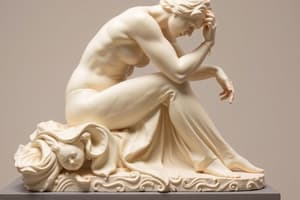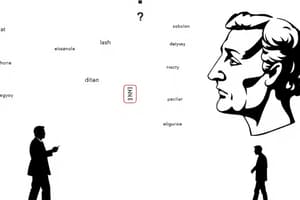Podcast
Questions and Answers
Symbolic proportion is ________________
Symbolic proportion is ________________
the apparent disproportionate relationship between objects within a piece.
Why did the artist choose to place the words vertically?
Why did the artist choose to place the words vertically?
She wanted the eyes to start at the top, and then move to the bottom of the page.
What is the difference between movement and rhythm?
What is the difference between movement and rhythm?
Movement is the sense of motion created by a piece, whereas rhythm is the simulation of motion through the repetition of an object or part in the piece.
What is asymmetry?
What is asymmetry?
As an architect incorporates structural balance, he/she considers _______________.
As an architect incorporates structural balance, he/she considers _______________.
In the image above, entitled Raft of the Medusa, the artist wanted to give ______________ to the man waving the flag or cloth in the upper right corner.
In the image above, entitled Raft of the Medusa, the artist wanted to give ______________ to the man waving the flag or cloth in the upper right corner.
Formal balance is _______________
Formal balance is _______________
What two principles of design did the artist rely on to convey a desired message or feeling?
What two principles of design did the artist rely on to convey a desired message or feeling?
All of the following are principles of design in art, except which?
All of the following are principles of design in art, except which?
In art, what does the term 'form' mean?
In art, what does the term 'form' mean?
Flashcards are hidden until you start studying
Study Notes
Symbolic Proportion
- Refers to the apparent disproportionate relationship between objects within an artwork.
Vertical Text Placement
- Placing words vertically directs the viewer's gaze from the top to the bottom, creating a specific flow in the composition.
Movement vs. Rhythm
- Movement: The sense of motion created by the artwork.
- Rhythm: The simulation of motion through the repetition of shapes or elements within the piece.
Asymmetry
- Achieves balance by positioning different objects or forms on either side of a central line, creating visual interest.
Structural Balance in Architecture
- Architects must consider both aesthetics and stability when incorporating structural balance into their designs.
Emphasis in Art
- The artwork "Raft of the Medusa" highlights the man waving the flag in the upper right corner to create emphasis on that figure.
Formal Balance
- Defined as linear symmetry, where two halves of an image mirror each other, contributing to a harmonious visual effect.
Principles of Design
- In creating art, variety and harmony are two essential principles that influence the message or feeling conveyed.
Exclusion from Principles of Design
- Color is not categorized as one of the core principles of design in art.
Definition of Form
- In art, "form" refers to any three-dimensional geometric shape and can also encompass the visible elements of a piece.
Studying That Suits You
Use AI to generate personalized quizzes and flashcards to suit your learning preferences.




